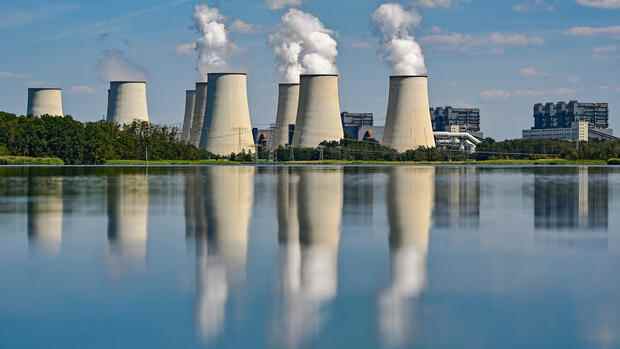Coal-fired power plants could replace the gas bottlenecks in the future.
(Photo: dpa)
Berlin The Bundestag has given the government extensive instruments in the gas crisis to support suppliers and cushion customer prices. On Thursday evening, parliament approved the reform of the Energy Security Act (Ensig), on the basis of which the federal government can react quickly to a further shortage of gas supplies and even higher prices.
In this way, regulations can be put into effect to support importers such as Uniper, who have been hit by the Corona crisis, up to and including state entry, based on the model of the Lufthansa rescue. It also contains regulations on how importers can pass on their additional costs more quickly and evenly. Coal-fired power plants that are mothballed or scheduled to be shut down can then be restarted in order to take gas-fired power plants off the grid.
Chancellor Olaf Scholz also promised companies and citizens help in the gas crisis in the evening, but brakes against expectations that are too high. “We will not be able to subsidize all prices,” said Scholz on Thursday on ZDF. “No country in the world can do that.” The government will also not be able to promise that it will be possible to stop the rise in gas and oil prices on the world market.
But the federal government is examining, for example, in the so-called concerted action with trade unions and employers, how one can and must help in view of the high energy prices, said Scholz. For many companies and private customers, the high gas prices have not yet had an impact, but this will happen with a time lag. The government is working flat out to prevent a gas shortage in Germany. Preparations are also being made in the event that this situation arises, said the Chancellor. However, it would be irresponsible to get involved in something that you are currently trying to avert, said Scholz.
Top jobs of the day
Find the best jobs now and
be notified by email.
He also contradicted the impression that the crisis was overwhelming Germany’s finances. “The state bankruptcy is really not imminent,” emphasized Scholz. On the contrary, Germany will return to the old level of debt “in a relatively short time” if everything continues as normal. The German economy has the potential to reduce debt. Compared to many other countries, Germany will come out of the crisis relatively well.
Defeat for Union faction
The Bundestag rejected an amendment by the Union parliamentary group that aimed to extend the lifetime of nuclear power plants. The CDU and CSU had proposed that the federal government be allowed to continue running the three remaining German nuclear power plants in addition to coal-fired power plants. The FDP had recently campaigned for this – but the Free Democrats were unable to assert themselves against the SPD and Greens in the coalition.
The law was written in an urgent procedure and still has to be approved by the Federal Council on Friday. This is considered safe. With the regulations, the government is arming itself for various scenarios in order to be able to act quickly. “We are in a phase where we have to keep all trading options,” said Economics Minister Habeck in the Bundestag.
The federal government is keeping an eye on the scheduled closure of the central gas pipeline Nord Stream 1 for regular maintenance from Monday. It should only last ten days. But Habeck also thinks a longer shutdown by Russia for political reasons is possible. Less than half of the gas ordered already flows through the pipeline, for which Russia cites technical reasons.
However, since the gas storage tanks are to be filled in the summer for the winter, the government would then have to act. By ministerial decree, coal instead of gas power plants could then go online, which Habeck has already announced as the next step. He also has the option of controlling consumption via specifications such as room temperature.
With regard to prices, the government can also use the law to support the suppliers: the importers currently have to buy the fuel expensively on the market due to failed deliveries and cannot pass it on to customers on the basis of the contracts. This has already prompted Uniper to call for help.
Supporting the suppliers would have the advantage that the increased gas prices would be dampened and delayed by public utilities and then also by industrial and household customers. However, should deliveries from Russia cease completely, state support alone should also reach its limits. In this case, an additional option is anchored in the draft law: all additional costs of all importers for the replacement procurement of the missing Russian gas would be divided up and distributed evenly but also at short notice to the customers despite existing contracts. The prerequisite would be that a gas shortage is officially determined.
More: The federal government is preparing a rescue package for the largest German gas trader. The government could participate with well over 30 percent.
